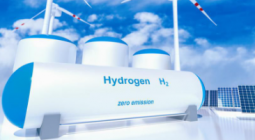'Universal' faith in hydrogen could lock world into fossil fuel reliance: German study.

Potsdam Institute for Climate Impact Research concludes electrification should lead with H2 reserved for decarbonising air travel and heavy-emitting industries.
Hydrogen should be reserved for focused use in decarbonising air travel and the world’s heavy-emitting industries or it could lock the world in to longer-term fossil fuel reliance and drive up greenhouse gas (GHG) emissions, according to a new German study.
Researchers at the Potsdam Institute for Climate Impact Research (PIK) concluded that hydrogen should only be used in sectors that “cannot be electrified” as production of the carrier is still “too inefficient, costly and [its] availability too uncertain, to broadly replace fossil fuels” in running cars or heating homes.
“For most sectors, directly using electricity for instance in battery electric cars or heat pumps makes more economic sense. Universally relying on hydrogen-based fuels instead and keeping combustion technologies threatens to lock in a further fossil fuel dependency and GHGs,” said PIK’s Falko Euckerdt, who lead the study.
“Hydrogen-based fuels can be a great clean energy carrier – yet great are also their costs and associated risks. Fuels based on hydrogen as a universal climate solution might be a bit of false promise. While they’re wonderfully versatile, it should not be expected that they broadly replace fossil fuels.”
Hydrogen-based fuels will “likely be scarce and not competitive for at least another decade”, said Euckerdt.
“Betting on their wide-ranging use would likely increase fossil fuel dependency: if we cling to combustion technologies and hope to feed them with hydrogen-based fuels…then we [might] end up further burning oil and gas and emit GHGs. This could endanger short- and long-term climate targets.”
Gunnar Luderer, head of PIK’s Energy Systems Group, said: “Tapping into the huge wind and solar energy potential of the global sun belts, e-fuels can be globally traded and thus resolve renewable energy bottlenecks in densely populated countries such as Japan or in Europe.
“However, as international and national climate targets require immediate emission reductions, from a climate perspective direct electrification should come first to assure a safe future for all.”
Hydrogen, Euckerdt stated, should be prioritised for “indispensable applications” including long-haul aviation, chemical feedstocks, steel production and a range of high-temperature industrial processes, sectors that “we can hardly electrify directly”.
The Paul Scherrer Institute’s Romain Sacchi, who co-authored the study, noted that the world was “far from [using] 100% renewable electricity” currently and an overeager switch to hydrogen over direct electrification alternatives could call for “two to fourteen times the amount of generation”.
“Low energy efficiencies cause a fragile climate effectiveness,” said Sacchi. “If produced with the current electricity mixes, hydrogen-based fuels would increase – not decrease – greenhouse gas emissions.”
The PIK research made a case study based on the German electricity mix in 2018, using hydrogen-based fuels in cars, trucks and planes, and found three to four times more GHG than using fossil fuel.
“Even if assuming 100% renewable electricity, the costs of avoiding one ton of CO2 emissions by using hydrogen-based fuels would currently be €800 ($965) for liquid and €1,200 for gaseous fuels,” according to the PIK calculus, “much higher than current CO2 prices in the European Emissions Trading Scheme, for instance, which are currently are €50/ton”.
Continued technological progress driven by CO2 prices as well as subsidies and investments into hydrogen and associated industries, the study calculated, could lead, however, to abatement costs dropping to €20 for liquid and €270 for gaseous e-fuels.
“Hence, with increasing CO2 prices hydrogen-based fuels could become cost competitive probably by 2040. This is too late for those sectors where direct electrification alternatives exist, given the urgency of greenhouse gas emissions reductions to stabilize our climate,” said Ueckerdt.
“Despite the uncertainties about future costs, hydrogen-based fuels have the potential to become a backstop technology for replacing all remaining fossil fuels around 2040-50. However, the realisation hinges on substantial large-scale policy support and in fact subsidies for about two decades before business cases might be secured solely by increasing carbon pricing,” he added.
6 May 2021
RECHARGE




